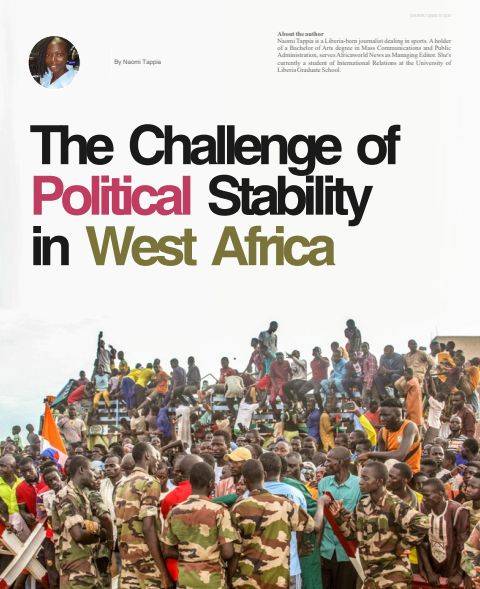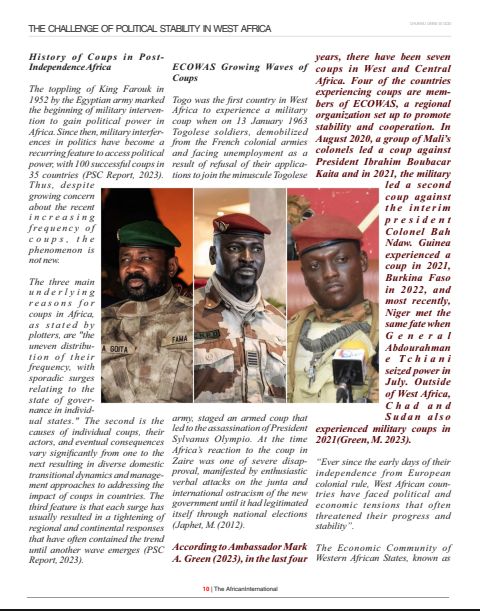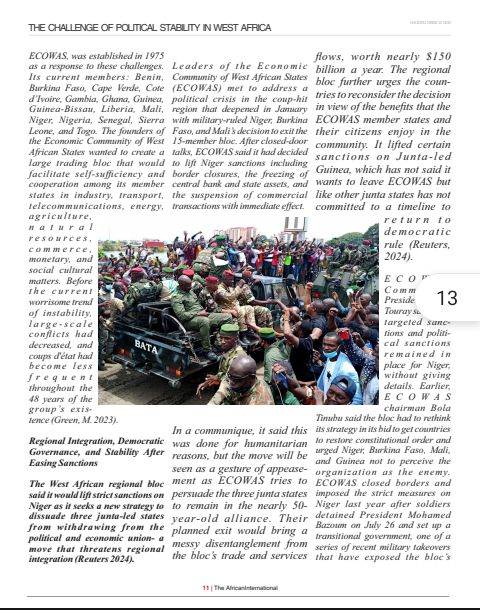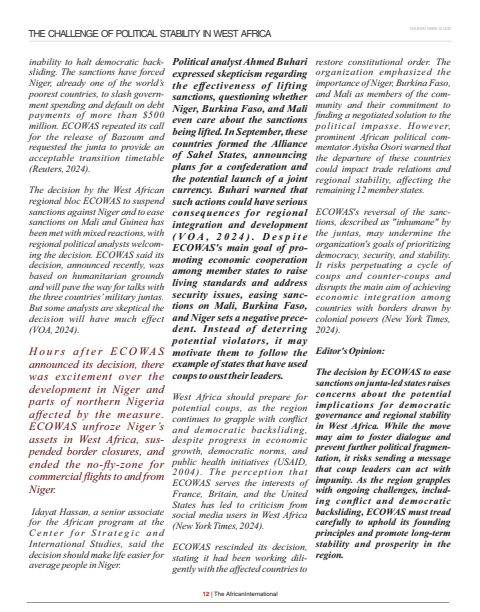By Naomi Tappia

History of Coups in Post-Independence Africa
The toppling of King Farouk in 1952 by the Egyptian army marked the beginning of military intervention to gain political power in Africa. Since then, military interferences in politics have become a recurring feature to access political power, with 100 successful coups in 35 countries (PSC Report, 2023). Thus, despite growing concern about the recent increasing frequency of coups, the phenomenon is not new.
The three main underlying reasons for coups in Africa, as stated by plotters, are “the uneven distribution of their frequency, with sporadic surges relating to the state of governance in individual states.” The second is the causes of individual coups, their actors, and eventual consequences vary significantly from one to the next resulting in diverse domestic transitional dynamics and management approaches to addressing the impact of coups in countries. The third feature is that each surge has usually resulted in a tightening of regional and continental responses that have often contained the trend until another wave emerges (PSC Report, 2023).
ECOWAS Growing Waves of Coups
Togo was the first country in West Africa to experience a military coup when on 13 January 1963 Togolese soldiers, demobilized from the French colonial armies and facing unemployment as a result of refusal of their applications to join the minuscule Togolese army, staged an armed coup that led to the assassination of President Sylvanus Olympio. At the time Africa’s reaction to the coup in Zaire was one of severe disapproval, manifested by enthusiastic verbal attacks on the junta and international ostracism of the new government until it had legitimated itself through national elections (Japhet, M. (2012).
According to Ambassador Mark A. Green (2023), in the last four years, there have been seven coups in West and Central Africa. Four of the countries experiencing coups are members of ECOWAS, a regional organization set up to promote stability and cooperation. In August 2020, a group of Mali’s colonels led a coup against President Ibrahim Boubacar Kaita and in 2021, the military led a second coup against the interim president Colonel Bah Ndaw. Guinea experienced a coup in 2021, Burkina Faso in 2022, and most recently, Niger met the same fate when General Abdourahmane Tchiani seized power in July. Outside of West Africa, Chad and Sudan also experienced military coups in 2021(Green, M. 2023).
“Ever since the early days of their independence from European colonial rule, West African countries have faced political and economic tensions that often threatened their progress and stability”.

The Economic Community of Western African States, known as ECOWAS, was established in 1975 as a response to these challenges. Its current members: Benin, Burkina Faso, Cape Verde, Cote d’Ivoire, Gambia, Ghana, Guinea, Guinea-Bissau, Liberia, Mali, Niger, Nigeria, Senegal, Sierra Leone, and Togo. The founders of the Economic Community of West African States wanted to create a large trading bloc that would facilitate self-sufficiency and cooperation among its member states in industry, transport, telecommunications, energy, agriculture, natural resources, commerce, monetary, and social cultural matters. Before the current worrisome trend of instability, large-scale conflicts had decreased, and coups d’état had become less frequent throughout the 48 years of the group’s existence (Green, M. 2023).
Regional Integration, Democratic Governance, and Stability After Easing Sanctions
The West African regional bloc said it would lift strict sanctions on Niger as it seeks a new strategy to dissuade three junta-led states from withdrawing from the political and economic union- a move that threatens regional integration (Reuters, 2024).

Leaders of the Economic Community of West African States (ECOWAS) met to address a political crisis in the coup-hit region that deepened in January with military-ruled Niger, Burkina Faso, and Mali’s decision to exit the 15-member bloc. After closed-door talks, ECOWAS said it had decided to lift Niger sanctions including border closures, the freezing of central bank and state assets, and the suspension of commercial transactions with immediate effect.
In a communique, it said this was done for humanitarian reasons, but the move will be seen as a gesture of appeasement as ECOWAS tries to persuade the three junta states to remain in the nearly 50-year-old alliance. Their planned exit would bring a messy disentanglement from the bloc’s trade and services flows, worth nearly $150 billion a year. The regional bloc further urges the countries to reconsider the decision in view of the benefits that the ECOWAS member states and their citizens enjoy in the community. It lifted certain sanctions on Junta-led Guinea, which has not said it wants to leave ECOWAS but like other junta states has not committed to a timeline to return to democratic rule (Reuters, 2024).
ECOWAS Commission President Omar Touray said some targeted sanctions and political sanctions remained in place for Niger, without giving details. Earlier, ECOWAS chairman Bola Tinubu said the bloc had to rethink its strategy in its bid to get countries to restore constitutional order and urged Niger, Burkina Faso, Mali, and Guinea not to perceive the organization as the enemy. ECOWAS closed borders and imposed the strict measures on Niger last year after soldiers detained President Mohamed Bazoum on July 26 and set up a transitional government, one of a series of recent military takeovers that have exposed the bloc’s inability to halt democratic backsliding. The sanctions have forced Niger, already one of the world’s poorest countries, to slash government spending and default on debt payments of more than $500 million. ECOWAS repeated its call for the release of Bazoum and requested the junta to provide an acceptable transition timetable (Reuters, 2024).
The decision by the West African regional bloc ECOWAS to suspend sanctions against Niger and to ease sanctions on Mali and Guinea has been met with mixed reactions, with regional political analysts welcoming the decision. ECOWAS said its decision, announced recently, was based on humanitarian grounds and will pave the way for talks with the three countries’ military juntas. But some analysts are skeptical the decision will have much effect (VOA, 2024).
Hours after ECOWAS announced its decision, there was excitement over the development in Niger and parts of northern Nigeria affected by the measure. ECOWAS unfroze Niger’s assets in West Africa, suspended border closures, and ended the no-fly-zone for commercial flights to and from Niger.
Idayat Hassan, a senior associate for the African program at the Center for Strategic and International Studies, said the decision should make life easier for average people in Niger.
Political analyst Ahmed Buhari expressed skepticism regarding the effectiveness of lifting sanctions, questioning whether Niger, Burkina Faso, and Mali even care about the sanctions being lifted. In September, these countries formed the Alliance of Sahel States, announcing plans for a confederation and the potential launch of a joint currency. Buhari warned that such actions could have serious consequences for regional integration and development (VOA, 2024). Despite ECOWAS’s main goal of promoting economic cooperation among member states to raise living standards and address security issues, easing sanctions on Mali, Burkina Faso, and Niger sets a negative precedent. Instead of deterring potential violators, it may motivate them to follow the example of states that have used coups to oust their leaders.
West Africa should prepare for potential coups, as the region continues to grapple with conflict and democratic backsliding, despite progress in economic growth, democratic norms, and public health initiatives (USAID, 2004). The perception that ECOWAS serves the interests of France, Britain, and the United States has led to criticism from social media users in West Africa (New York Times, 2024).
ECOWAS rescinded its decision, stating it had been working diligently with the affected countries to restore constitutional order. The organization emphasized the importance of Niger, Burkina Faso, and Mali as members of the community and their commitment to finding a negotiated solution to the political impasse. However, prominent African political commentator Ayisha Osori warned that the departure of these countries could impact trade relations and regional stability, affecting the remaining 12 member states.
ECOWAS’s reversal of the sanctions, described as “inhumane” by the juntas, may undermine the organization’s goals of prioritizing democracy, security, and stability. It risks perpetuating a cycle of coups and counter-coups and disrupts the main aim of achieving economic integration among countries with borders drawn by colonial powers (New York Times, 2024).

Editor’s Opinion:
The decision by ECOWAS to ease sanctions on junta-led states raises concerns about the potential implications for democratic governance and regional stability in West Africa. While the move may aim to foster dialogue and prevent further political fragmentation, it risks sending a message that coup leaders can act with impunity. As the region grapples with ongoing challenges, including conflict and democratic backsliding, ECOWAS must tread carefully to uphold its founding principles and promote long-term stability and prosperity in the region.

